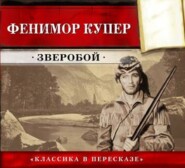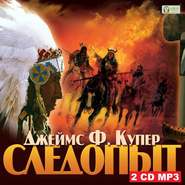По всем вопросам обращайтесь на: info@litportal.ru
(©) 2003-2024.
✖
The Spy: Condensed for use in schools
Настройки чтения
Размер шрифта
Высота строк
Поля
“He lives among the colored people in the south, and he has lately had a scrimmage with this Colonel Tarleton” —
“Who defeated him, of course?” cried Sarah, with confidence.
“So say the troops at Morrisania.”[18 - a village in Westchester County, north of the Harlem River.]
“But what do you say?” Mr. Wharton ventured to inquire, yet speaking in a low tone.
“I repeat but what I hear,” said Birch, offering a piece of cloth to the inspection of Sarah, who rejected it in silence, evidently determined to hear more before she made another purchase.
“They say, however, at the Plains,”[19 - White Plains.] the peddler continued, first throwing his eyes again around the room and letting them rest for an instant on Harper, “that Sumpter and one or two more were all that were hurt, and that the rig’lars[20 - regular troops, British.] were all cut to pieces, for the militia were fixed snugly in a log barn.”
“Not very probable,” said Sarah, contemptuously,[21 - with scorn.] “though I make no doubt the rebels got behind the logs.”
“I think,” said the peddler, coolly, again offering the silk, “it’s quite ingenious to get a log between one and a gun, instead of getting between a gun and a log.”
The eyes of Harper dropped quietly on the pages of the volume in his hand, while Frances, rising, came forward with a smile on her face, as she inquired, in a tone of affability[22 - readiness to converse.] that the peddler had never witnessed from the younger sister:
“Have you more of the lace, Mr. Birch?”
The desired article was produced, and Frances became a purchaser also.
“So it is thought that Colonel Tarleton has worsted General Sumpter?” said Mr. Wharton.
“I believe they think so at Morrisania,” said Birch, dryly.
“Have you any other news, friend?” asked Captain Wharton, venturing to thrust his face without the curtains.
“Have you heard that Major André[23 - British spy, captured near Tarrytown, and hanged near Tappan.] has been hanged?”
Captain Wharton started, and for a moment glances of great significance[24 - The glances conveyed a hidden meaning.] were exchanged between him and the trader, when he observed, with affected indifference, “that it must have been some weeks ago.”
“Is there any probability of movements below, my friend, that will make travelling dangerous?” asked Harper, looking steadily at the other in expectation of his reply.
Some bunches of ribbon fell from the hands of Birch; his countenance changed instantly, losing its keen expression in intent meaning, as he answered slowly: “It is some time since the rig’lar cavalry were out, and I saw some of DeLancey’s[25 - DeLancey was a British officer in command of the Cow-Boys] men cleaning their arms as I passed their quarters; it would be no wonder if they took the scent soon, for the Virginia horse are low in the county.”
“Are they in much force?” asked Mr. Wharton.
“I did not count them.”
Frances was the only observer of the change in the manner of Birch, and on turning to Harper, he had resumed his book in silence. She said, blushing with a color that suffused[26 - overspread.] her neck:
“I thought the Southern horse had marched towards the Delaware.”
“It may be so,” said Birch; “I passed the troop at a distance.”
Cæsar had now selected a piece of calico, in which the gaudy colors of yellow and red were contrasted on a white ground, and, after admiring it for several minutes, he laid it down with a sigh, as he exclaimed: “Berry pretty calico.”
The party sat in silence for many minutes after the peddler had withdrawn, when the stranger suddenly broke it by saying:
“If any apprehensions[27 - fears.] of me induce Captain Wharton to maintain his disguise, I wish him to be undeceived; had I motives for betraying him, they could not operate under present circumstances.”
The younger sister sank into her seat colorless and astonished. Miss Peyton dropped the tea-tray she was lifting from the table, and Sarah sat with her purchases unheeded in her lap, speechless with surprise. Mr. Wharton was stupefied; but the captain, hesitating a moment from astonishment, sprang into the middle of the room, and exclaimed, as he tore off the instruments of disguise:
“I believe you, from my soul, and this tiresome imposition shall continue no longer. Yet I am at a loss to conceive in what manner you should know me.”
“You really look so much better in your proper person, Captain Wharton,” said Harper, with a slight smile, “I would advise you never to conceal it in future. There is enough to betray you, if other sources of detection were wanting.” As he spoke, he pointed to a picture suspended over the mantelpiece, which exhibited the British officer in his regimentals.
“I had flattered myself,” cried young Wharton, with a laugh, “that I looked better on the canvas than in a masquerade. You must be a close observer, sir?”
“Necessity has made me one,” said Harper, rising from his seat.
Frances met him as he was about to withdraw, and, taking his hand between her own, said with earnestness, her cheeks mantling with the richest vermilion[28 - a bright red color.]: “You cannot – you will not betray my brother!”
For an instant Harper paused in silent admiration of the lovely pleader, and then, folding her hands on his breast, he replied solemnly: “I cannot, and I will not.” He released her hands, and laying his own on her head, gently, continued: “If the blessing of a stranger can profit you, receive it.” He turned, and bowing low retired, with a delicacy that was duly appreciated by those he quitted, to his own apartment.
The whole party were deeply impressed with the ingenuous[29 - open; frank.] and solemn manner of the traveller, and all but the father found immediate relief in his declaration.
CHAPTER III.
THE STRANGER’S WARNING AND THE PEDDLER’S RETURN
On the afternoon of the succeeding day, the party were assembled in the parlor around the tea-table of Miss Peyton, when a change in the weather occurred. The rushing winds had ceased, the pelting of the storm was over, and, springing to the window, Frances saw a glorious ray of sunshine lighting up the opposite wood. The foliage glittered with the checkered beauties of the October leaf, reflecting back from the moistened boughs the richest lustre of an American autumn. In an instant, the piazza, which opened to the south, was thronged with the inmates of the cottage. The air was mild, balmy, and refreshing; in the east, clouds, which might be likened to the retreating masses of a discomfited[30 - defeated.] army, hung around the horizon in awful and increasing darkness. At a little elevation above the cottage, the thin vapor was still rushing towards the east with amazing velocity; while in the west the sun had broken forth and shed his parting radiance on the scene below, aided by the fullest richness of a clear atmosphere and a freshened herbage.
“What a magnificent scene!” said Harper, in a low tone; “how grand! how awfully sublime! May such a quiet speedily await the struggle in which my country is engaged, and such a glorious evening follow the day of her adversity!”
“There can be no danger apprehended from such a man,” thought Frances; “such feelings belong only to the virtuous.”
The musings of the party were now interrupted by the sudden appearance of the peddler. “Fine evening,” he said, saluting the party, without raising his eyes; “quite warm and agreeable for the season.”
Mr. Wharton assented to the remark, and inquired kindly after the health of his father. Harvey answered with a slight tremor in his voice:
“He fails fast; old age and hardships will do their work.” The peddler turned his face from the view of most of the family, but Frances noticed his glistening eyes and quivering lips, and for the second time Harvey rose in her estimation.
The valley in which the residence of Mr. Wharton stood ran in a direction from northwest to southeast, and the house was placed on the side of a wall which terminated[31 - ended.] its length in the former direction. A small opening, occasioned by the receding of the opposite hill, and the fall of the land to the level of the tide water, afforded a view of the Sound[32 - Long Island Sound.] over the tops of the distant woods on its margin. The surface of the water, which had so recently been lashing the shores with boisterous fury, was already losing its ruffled darkness in the long and regular undulations[33 - waves.] that succeed a tempest, while the light air from the southwest was gently touching their summits, lending its feeble aid in stilling the waters. Some dark spots were now to be distinguished, occasionally rising into view, and again sinking behind the lengthened waves which interposed themselves to the sight. They were unnoticed by all but the peddler. He seated himself on the piazza, at a distance from Harper, and appeared to have forgotten the object of his visit. His roving eye, however, soon caught a glimpse of these new objects in the view, and springing up with alacrity[34 - readiness.] gazed intently towards the water. He changed his place, glanced his eye with marked uneasiness on Harper, and then said with great emphasis:
“The rig’lars must be out from below.”
“Why do you think so?” inquired Captain Wharton, eagerly. “God send it may be true; I want their escort in again.”
“Them ten whaleboats would not move so fast unless they were better manned than common.”
“Perhaps,” cried Mr. Wharton in alarm, “they are – they are Continentals returning from the island.”
“They look like rig’lars,” said the peddler, with meaning.
“Look!” repeated the captain, “there is nothing but spots to be seen.”
Harvey, disregarding his observation, said in an undertone, “They came out before the gale – have laid on the island these two days – horse are on the road – there will soon be fighting near us.” During this speech, Birch several times glanced towards Harper, with evident uneasiness, who stood in silent contemplation[35 - thinking.] of the view, and seemed enjoying the change in the air. As Birch concluded, however, Harper turned to his host, and mentioned that his business would not admit of unnecessary delay; he would, therefore, avail himself of the fine evening to ride a few miles on his journey. Mr. Wharton made many professions of regret, but was too mindful of his duty not to speed the parting guest, and orders were instantly given to that effect.

















